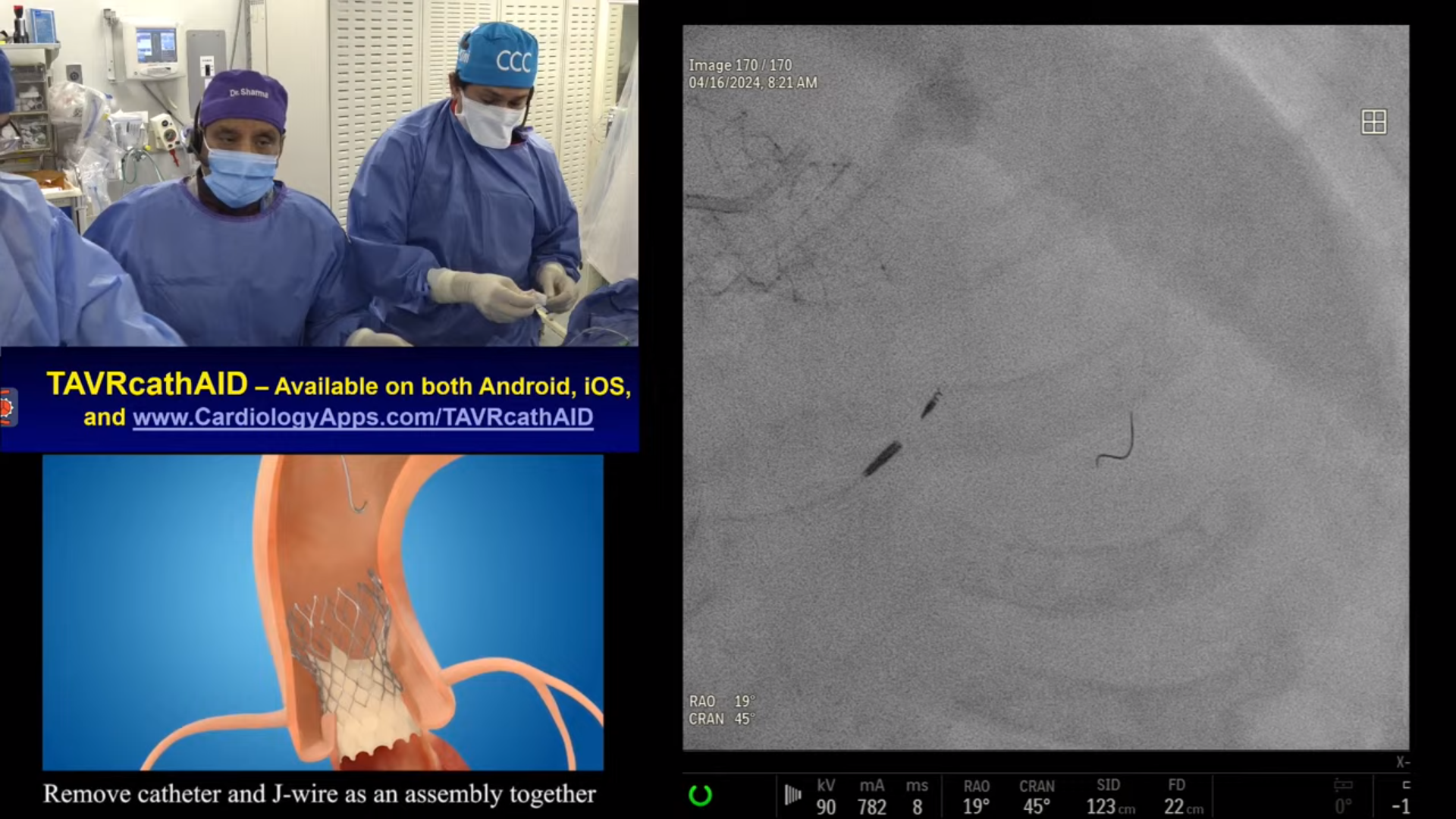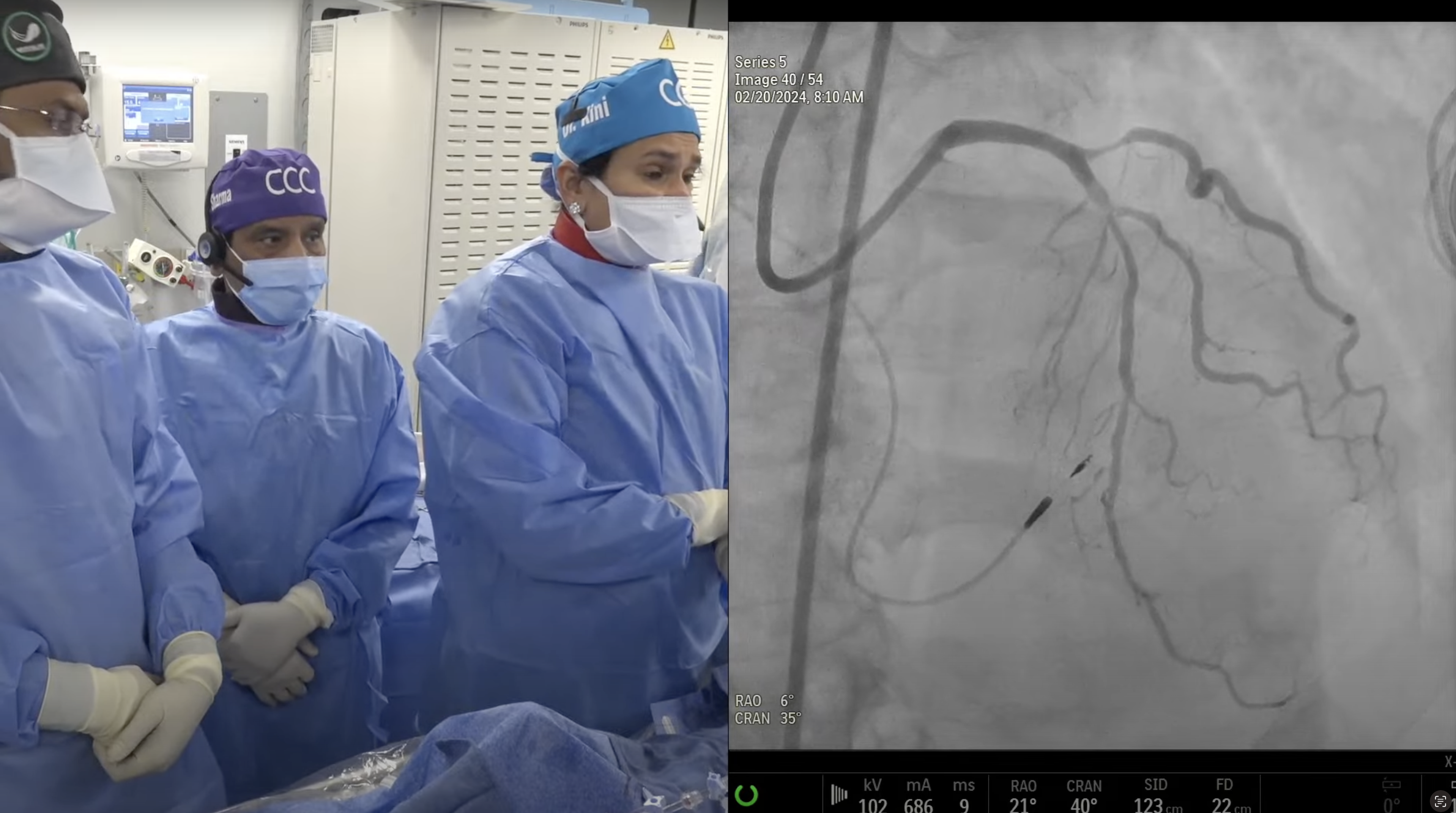58 year old male presented with new onset CCS Class II angina and a positive stress MPI for inferior and lateral ischemia. A Cardiac Cath on September 5, 2017 revealed LM and III Vessel CAD: multiple lesions in RCA with distal total occlusion, 70% calcified distal LM (MLA 4mm2 on IVUS), 70% ostial diagonals, 80% proximal LCx-OM1 bifurcation (Medina 1,1,1), 60% proximal ramus with SYNTAX Score of 51 and LVEF = 60%. Patient was recommended CABG, but declined after Heart Team discussion. Patient then underwent PCI of RCA using four DES (Xience Alpine). Patient is now planned for staged PCI of LM and LCx using rotational atherectomy and DES with IVUS guidance.
Moderator: Sameer Mehta, MD
Q&A
Q
Congratulations for your 100 cases! Who do you think has benefited the most from ccclivecases.org?
A.
Amongst the 7000+ monthly viewers, most benefited are the Interventional fellows and junior Interventionslist. In every local and national meeting I attend, numerous fellows and interventionalists will approach me thanking us for the tremendous education ccclive webcast is providing. Many of the centers have made this as their monthly journal club activity. These compliments certainly underscore the main mission of ccclive webcast of providing the latest technical aspects of safely performing complex Interventional cases. Hence ccclive webcast certainly is a very useful resource for the Interventional fellows!
Q
Which case out of 100 do you feel is the best teaching case?
A.
The most important teaching case has to be the case #48 June 2013, during which we had acute closure of the LM causing severe CV collapse and CT surgeon inserted the ECMO in the Cath lab. We then completed the PCI using mini rush technique for LM to LAD and crush stent in LCx. Ultimately pt made the full physical, cardiac and neurological recovery and is still asymptomatic 4+ yrs post PCI. Numerous teaching points were discussed about case on the procedure day as well as in the July 2013 webcast wrap up.
Q
Which topic of discussion in 100 cases, can you remember as being the most relevant?
A.
Most important topic of discussion in our ccclive webcast remains the emphasis on the Appropriate Use Criteria (AUC) in each PCI case.
Q
Do you consider mandated discussions on AUC as one of the best contributions of your webcast?
A.
Absolutely agree that the importance of the AUC teaching is the best contribution of the ccclive webcast to the Interventional community.
Q
Which are the top 3 countries from which viewers watch you?
A.
USA, India and UK.
Q
How can your cases help prepare for the Interventional Board Review examination?
A.
Our didactic discussion before the case and final three Q&A at the end of each case certainly covers many Interventional board questions. Additionally questions about various interventional techniques during the performance of the cases, certainly will answer many of the Interventional board questions.
Q
Are your cases tailored for Fellows in Training or for the practicing Interventionalist?
A.
Yes we usually select a case for the live webcast which has an educational angle especially utilizing the evolving techniques and procedural strategies. Hence ccclive webcast is tailored for the fellows-in-training and junior interventionalists.
Q
Is the Bifurcaid App available now?
A.
Yes. The Bifurcaid app is freely available for download and practical use. It is indeed very helpful for the Interventionalist to navigate through the step by step performance of a bifurcation lesion. Start up point is LM or non-LM bifurcation lesion.
Q
Does your Manual serve as the accompaniment for the live cases?
A.
Yes our Interventional manual for fellows, Cath lab manual of Interventions and Bifurcaid app, all serve as the accompaniment for the ccclive cases with a common focus of teaching the Interventional techniques in a systematic protocolized fashion.
Q
Are you contemplating any changes in your live cases format?
A.
We will continue the same format of ccclive cases with more outreach and advertisement via various social media, internet and enhanced list of the interventionalists. We are also planning to make it a CME event with 1 Hour of CME credit starting Jan-Feb 2018.





